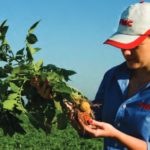Berlin | Reuters — Germany plans to make it more difficult for farmers to use crop insecticides in a bid to preserve biodiversity, an environment ministry document showed. “Insect biomass has fallen by more than 75 per cent in the last 27 years in Germany,” according to the paper seen by Reuters on Wednesday, saying […] Read more

Germany plans to toughen conditions for insecticide use

Minnesota joins U.S. states limiting dicamba
Chicago | Reuters — Minnesota became the latest U.S. state on Tuesday to restrict controversial weed killers made by Monsanto and BASF that were linked to widespread crop damage, while Arkansas took a step back from imposing new limits. The U.S. has faced an agricultural crisis this year caused by new versions of the herbicides, […] Read more

FMC deal for DuPont assets wins clearances
The chemical company set to take up a significant chunk of DuPont’s crop protection work in Canada has picked up the last of the regulatory clearances it needs to close the deal. Philadelphia-based FMC Corp. announced Thursday it received the final approval needed, from the Competition Commission of India, to close the deal the company […] Read more

Herbicide supplier Albaugh said to be exploring sale
Reuters — Albaugh LLC is exploring a sale that could value the privately held U.S. producer of agricultural crop protection chemicals at more than US$1.5 billion, including debt, according to people familiar with the matter. Albaugh, controlled by its 67-year-old founder Dennis Albaugh, is working with investment bank JPMorgan Chase and Co. to discuss a […] Read more

Saskatchewan herbicide resistance a heads-up for Alberta
More than half of fields surveyed had a resistant weed, with Group 1-resistant wild oat at the top of the list
Reading Time: 3 minutes Alberta’s herbicide-resistant weed survey is underway this summer, but the results from Saskatchewan paint a grim picture of what to expect here. “Since 2009, there’s been an 89 per cent increase in the land area affected by herbicide-resistant weeds,” said federal research scientist Breanne Tidemann. “We are in a fairly steep incline in terms of […] Read more
‘Wake-up call’ needed for resistance
Provincial crop expert says it’s time to stop pretending it’s not ‘a huge issue’
Reading Time: 3 minutes Weed resistance has been an issue in crop production for many years, but is coming to the forefront as increasing numbers of weeds are no longer responding to herbicides. “Most producers are aware of the issue, but unless it affects them directly, don’t see it as a huge issue,” said provincial crop specialist Harry Brook. […] Read more

Know your enemy and its destructive potential, says provincial crop specialist
There’s a critical window for controlling weeds, but it depends on both the crop and the threat posed by individual species
Reading Time: 2 minutes All crops have a critical weed control period when they are most susceptible to significant yield loss from weed competition. The critical weed control period for canola is around 17 to 38 days after emergence. Peas can be as early as two weeks after emergence. “Other, more competitive crops, like the cereals, have a less […] Read more

Proposed Dow, DuPont merger gets conditional nod from China
Beijing | Reuters — China has conditionally approved the proposed merger between Dow Chemical and DuPont, the country’s commerce ministry said on Tuesday, a step forward for the deal whose closing has been repeatedly delayed by regulatory hurdles. The merger was approved by EU antitrust regulators in March on the condition the companies divest assets […] Read more

‘Mystery’ canola attacker stumps scientists
Researchers have been trying to solve this ‘whodunit’ for years but so far, no one has been able to crack the case
Reading Time: 2 minutes It’s a classic ‘whodunit’ — the Case of the Confounding Canola Killer. And Alberta researchers are still scratching their heads over it 15 years later. “Since 2002, we’ve been finding this ‘mystery syndrome,’ and I don’t have a cause for it,” said provincial oilseed specialist Murray Hartman. “We get one nice flower that turns into […] Read more

FMC buying much of DuPont’s crop protection business
FMC and DuPont have inked a deal that will see FMC pick up the portion of DuPont’s crop protection business the EU says must be divested for the DuPont-Dow merger to go ahead. In exchange DuPont will acquire FMC Health and Nutrition along with $1.2 billion (all figures U.S. funds) in cash. FMC will acquire […] Read more

